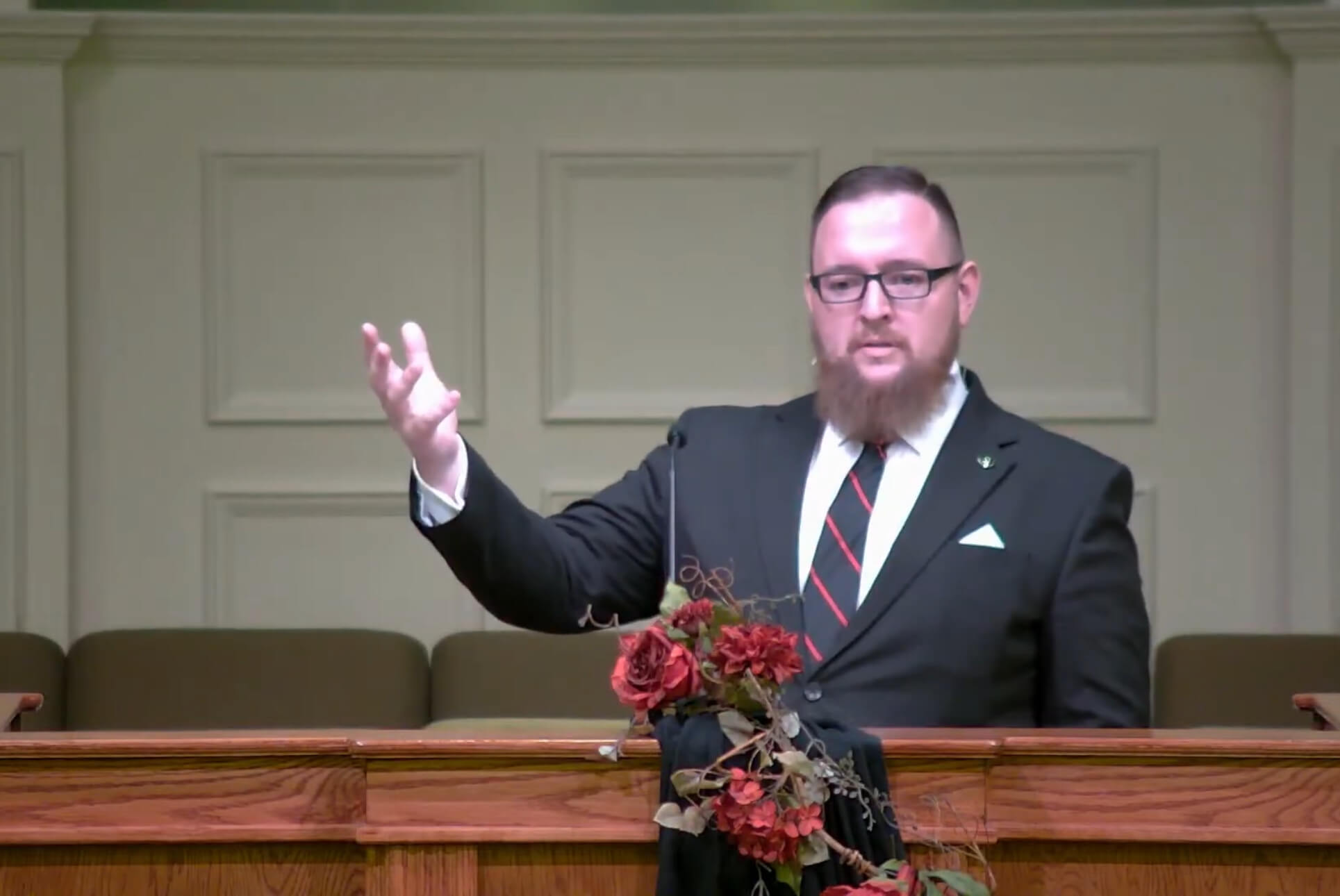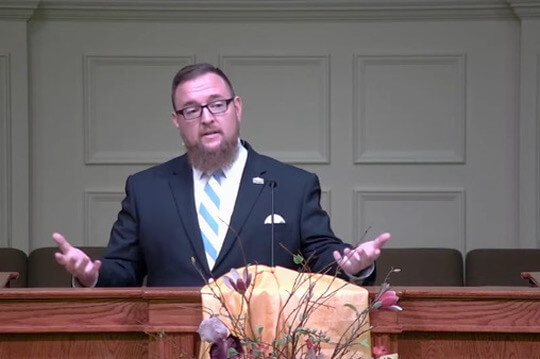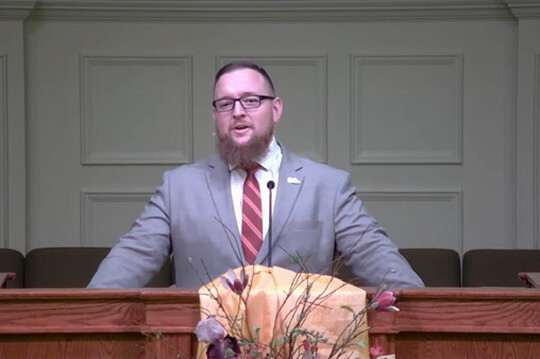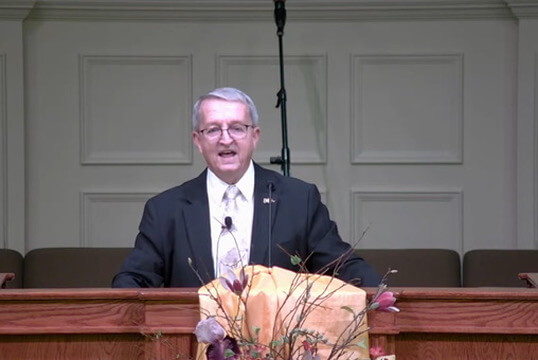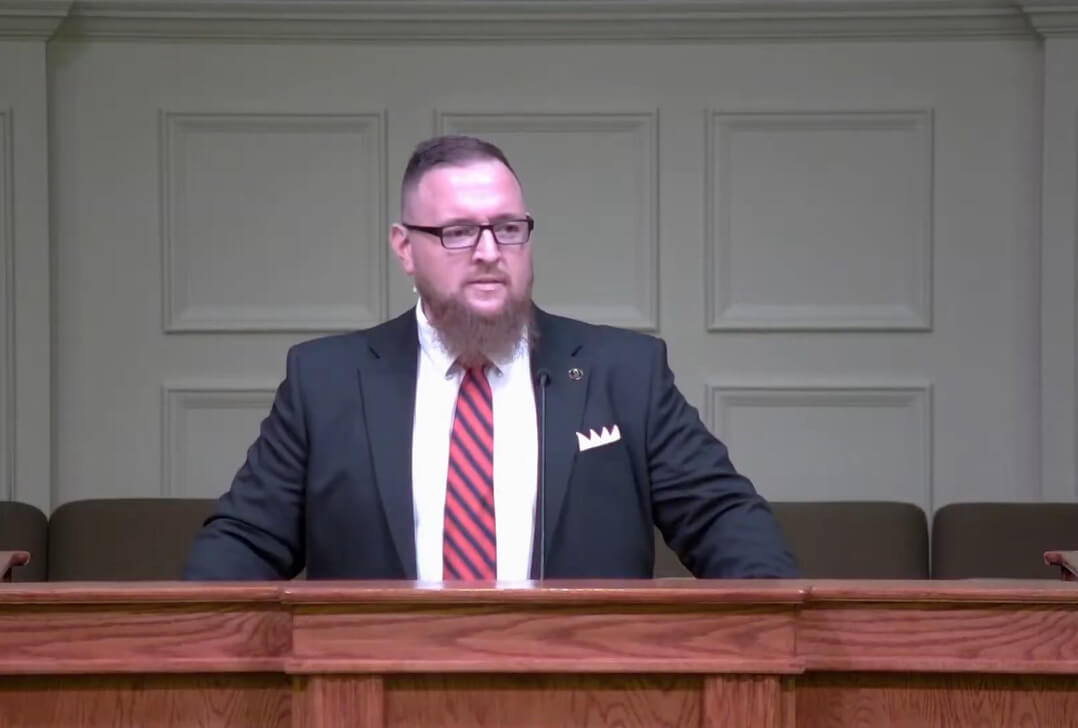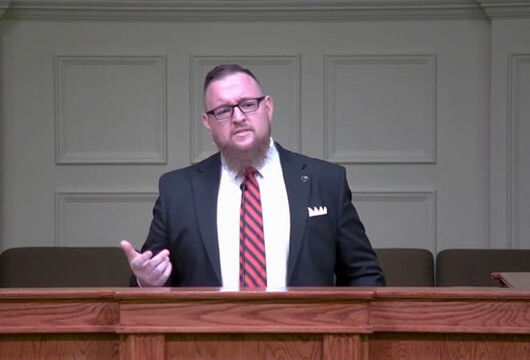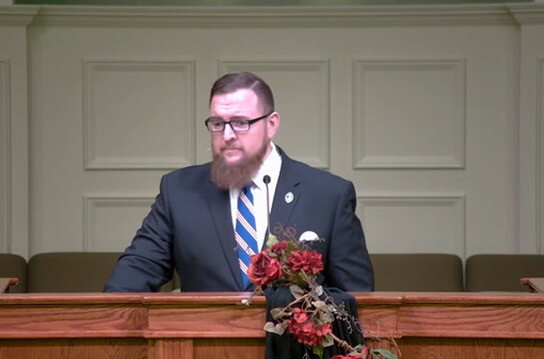Video
“The Word Incarnate”
John 1:14-18
Pastor Ryan J. McKeen
02/09/2025
Audio
Transcript
Turn with me in your Bibles to the book of John chapter 1. We are still here in the prologue of John’s gospel. There are really three sections of this prologue, and we’ve come through the first two.
In this first section, we saw John proclaim that Jesus is God, and he proved that several ways, that he is the word. He always was. He was face-to-face with God. He was God. He was the creator, and he is the life and the light. He has life in himself. And all that was in this first paragraph of this gospel.
Then as we saw last week, John transitioned from speaking about who Jesus is, his identity, and spoke about the response to Jesus, the response to the fact that he is God. We saw him introduce John the Baptist as a witness to the fact of who Jesus is. Then we saw the two responses that everybody has to Christ. Some people reject him. He came to his own, and his own did not receive him.
But then we also saw that others do receive Jesus, and they believe on his name. They believe that Jesus is who he says he is, and that he has done what he says he has done. We saw in verses 12 and 13, but as many as received him, to them he gave the right to become the children of God, even to those who believe in his name, who were born not of blood, nor of the will of the flesh, nor of the will of man, but of God. And that is where we left off last week in verse 13.
And as we come to our text this morning, we see the third and final section of John’s prologue, his introduction to this book. It is the culmination of everything he’s been saying. He’s been building toward this revelation. And here in this text, we see the miracle of the incarnation. That word incarnation simply means that he took on flesh or he became flesh, his enfleshment. And that’s the exact phrase we see in our text this morning, that he became flesh.
I spoke on the incarnation last summer as part of the series on the Trinity. And in that sermon, we looked at this verse, but we also looked at Philippians 2. And I do like to sing the Wesleyan hymn, And Can It Be, when we talk about the incarnation, so that we can rightly think about and correct the theology in that song. That he did not empty himself of anything that it takes to be God, otherwise he could not be God with us. He could not be the fullness of deity dwelling bodily. No, he did not empty himself of anything, but the emptying was himself taking on flesh.
The incarnation is the most wondrous miracle that we could consider. I mean, think of it. The infinite, eternal, self-existent, self-sufficient, almighty God takes on the nature of finite, temporal, dependent, mortal humanity. And he takes that into personal union with his divine nature. And all of that without changing or shedding what makes him God. The unchangeable God becomes what he wasn’t. while never ceasing to be what he always was. As sinful fallen creatures, we have destroyed ourselves. We have ruined our relationship with God. We have severed that relationship by offending the infinitely holy God with our disobedience and our lawlessness. And our sinfulness required an infinite punishment.
Because God is infinitely holy, to offend his holiness requires infinite punishment. Eternity in hell under God’s infinite wrath. And no man could ever pay that infinite penalty without perishing. And yet, The problem was that only a man could pay because it was man who sinned. Only a man could ever righteously offer a satisfactory atonement. But only God himself could atone for sin. So we’re left with an impossible dilemma. Only God has the ability to atone for sin, and yet only man’s sacrifice is acceptable.
That’s why, as I quoted back in that sermon last summer, Dr. Mike Riccardi sums this up so well, and he says this, no one ought to pay but man, and no one can pay but God. And so, to reconcile man to God, God became a man. Jesus Christ is fully and truly man. And therefore, he is able to stand in man’s place. Only Jesus could bear man’s punishment and accomplish man’s righteousness. Because at the same time, he is fully and truly man, and yet he is fully and truly God. He is able to bear the infinite wrath of God against our sins. This is the gospel. This is the only way for the sins of God’s people to be atoned for. This is the most glorious of all of God’s works. It is the miracle of miracles.
For the first 500 years of the church, there was a battle over what this actually means, that the word became flesh, that the eternal Son of God took to himself a human nature. During that time, there were many false teachings about this truth. what we call the hypostatic union, the union of the divine nature and the human nature in one. And all of these false teachings were put forth and examined and ultimately rejected.
Some said that Jesus didn’t have a human nature, but he was just a divine nature with a human body. So he was partly God and partly man. Others said that The divine spirit didn’t enter Jesus until he was baptized, and then left him when he was on the cross. Others said he was a created being, inferior to God the Father, but became God later on. Some said he was two persons in the one body, one human person and another divine person. And all of these perspectives on the Incarnation failed to preserve the truth revealed in Scripture. They all failed somewhere. They all had somewhere in Scripture that proves that that is the wrong perspective on what the Incarnation is.
And so finally, in the year 451, leaders in the church came together. and they formed a statement that clarified what it is that scripture says definitively about the incarnation. That was the Council of Chalcedon, and the statement is called the Chalcedonian Creed. Again, we read that back in the summer, but listen, I’ll read it again for us, and listen how carefully these church leaders are to preserve biblical truth And all of this is to explain this little phrase, the word became flesh. And this is what they had to say.
Therefore, this is the Chalcedonian Creed. Therefore, following the Holy Fathers, we all with one accord teach men to acknowledge one and the same son, our Lord Jesus Christ, at once complete in Godhead and complete in manhood. truly God, and truly man, consisting also of a reasonable soul and body, of one substance with the Father as regards His Godhead, and at the same time, one substance with us as regards His manhood. Like us in all respects apart from sin, as regards His Godhead, begotten of the Father before the ages, but yet as regards His manhood, begotten for us and for our salvation, of Mary the Virgin, the God-bearer, and one in the same Christ, Son, Lord, only begotten, recognized in two natures, without confusion, without change, without division, without separation, the distinction of natures being in no way annulled by the union, but rather The characteristics of each nature being preserved and coming together to form one person and one subsistence, not as parted or separated into two persons, but one in the same, son and only begotten God, the word, the Lord Jesus Christ. Even as the prophets from the earliest time spoke of him and our Lord Jesus Christ himself taught us and the creed of the fathers handed down to us.
All of that, to explain what John means with these four words. The word became flesh. James Montgomery Boyce said that this verse is the great sentence for which the gospel of John was written. This is the culmination of his introduction. This is what it’s all about. It was a dividing line for a lot of the early battles in the church. And it is still a stumbling block for many cults and false religions today. But John is clear. Jesus Christ is truly God and truly man. And that is what the incarnation must mean. And that’s what we will see in our text this morning. That’s what we as Christians must confess.
So as we look at our text this morning, We will cover John 1 verses 14 through 18. There’s three divisions here. We’ll see number one, the fact of the incarnation. That’s in verse 14. And then we see the testimony of the incarnation. And that’s verses 15 and 16. And lastly, we’ll see the significance of the incarnation. And that’s how we’ll divide our text up, but much like with the first paragraph of this prologue, I don’t think we’re going to get through it all today. I’m pretty sure we’re only going to get through verse 14, but that’s all right because there is so much here that we need to understand. This is what John’s entire gospel is about, is the incarnation, that Christ came. We’ll probably need to finish this passage next week, but let me read our entire passage this morning.
John 1, verses 14 through 18. This is the word of the Lord. And the word became flesh and dwelt among us, and we beheld his glory. Glory as of the only begotten from the Father, full of grace and truth. John bore witness about him and cried out saying, this was he of whom I said, he who comes after me has been ahead of me for he existed before me. For of his fullness, we have all received and grace upon grace. For the law was given through Moses, grace and truth came through Jesus Christ. No one has seen God at any time. the only begotten God who is in the bosom of the Father, he has explained him. This is our key passage on the incarnation. We see first of all in verse 14 the fact of the incarnation, the fact we must believe as Christians.
This is one of the most significant verses in all of scripture. If you don’t have this verse memorized yet, it’d be a great one to memorize, because this is what makes us who we are. It begins with four simple words. The word became flesh. Again, these four words express the unfathomable reality that in the incarnation, God took on humanity. Those four words don’t seem to make any sense. How could it be that the one we’ve just proven is God, the word? He took on flesh, took on humanity. The infinite became finite. The eternal one entered time. The invisible became visible. The Creator entered His creation. And yet, God does not change. And He did not change what He always was. Jesus Christ truly was God with us.
As we mentioned before, Colossians 1:19 says, for in Him, in Him, all the fullness of God was pleased to dwell. Everything that is God, everything it takes to be God, dwelt in the Son, in Christ. We mentioned before how God has been revealing himself over time. He revealed himself in creation. Hebrews chapter 1, we saw God, having spoken long ago to the fathers and the prophets in many portions and many ways in these last days, spoke to us in His Son, the Word, whom He appointed the heir of all things and through whom He also made the worlds.
As we covered in John 1:1, this one, the Word, the logos. had great significance to the Greeks and the Jews. They all understood the importance of this idea of the logos, the word. To the Greeks, the logos was the creative force, the logic of the world. To the Jews, the word of God. That is how they knew God. And now John says this word, the one who always was, the one who was God. This word became flesh.
Augustine, one of the greatest theologians of the early church, he was raised and trained in Greek thought. He was raised and trained by Greek philosophers. And he said that he had read all about the Logos. And he even believed that the Logos was God. He believed all of that. He believed the Logos created the world. He’d read all of that in his Greek philosophy reading. But he had never heard that the Word became flesh, became a man, until he read John. It was a totally foreign concept for that time. And it was one that completely changed Augustine’s life. Jesus Christ, God’s final word to mankind. He became flesh.
Sometimes in scripture we read of that word flesh, and it refers to man’s sinfulness. The flesh versus the spirit. But that’s not how that word’s being used here. Jesus Christ did not take on our sinfulness. This word flesh just refers to man’s physical being, his humanity, what it means to be a man. He was truly a man. And that word became, it’s another important word. It doesn’t mean that Christ no longer was the eternal word of God, the son. It doesn’t mean that God changed from God into human. That’s not what became means there. God is unchangeable. He is a pure, eternal being. And as we’ve seen this play on words throughout John’s introduction, the word was, everything else came to be. John came to be. And this word here is meant to be a logical conundrum.
How can the one that was become? That’s impossible. It’s a miracle. It is a miracle. And miraculously, in the incarnation, the unchangeable God became fully man. And he remained fully God. To quote another theologian who was part of the Chalcedonian controversy and helped to think through these issues, Cyril of Alexandria, He explained it this way, we do not assert that there was any change in the nature of the word when it became flesh, or that it was transformed into an entire man consisting of soul and body, but we say that the word, in a manner indescribable and inconceivable, united personally to himself flesh, animated with a reasonable soul, and thus became man, and was called the son of man. That is the incarnation. The Word became flesh.
This is what Christians have always confessed, beginning with the words of the Apostle Paul in 1 Timothy, which this verse, 1 Timothy 3:16, became a creed of the early church. This is what they confessed. This is what marked them out as Christians. 1 Timothy 3:16 says, and by common confession, Great is the mystery of godliness. And this is their confession. He who is manifested in the flesh was vindicated by the spirit, seen by angels, proclaimed among the nations, believed on in the world, and taken up in glory. That is what we must believe as Christians, by common confession.
The Word, the eternal Son of God, took on true humanity. He took on flesh. And as I read earlier, anyone who does not confess this, does not confess that Jesus was eternally God and yet he came in human flesh, anyone who does not confess that is not a Christian. John makes that clear in the passage I read earlier in John chapter 4 verses 1 through 3. I read that in that passage, he says, every spirit that confesses that Jesus Christ has come in the flesh is from God. And every spirit that does not confess Jesus is not from God. This is how you know how someone is a Christian. This is one of the tests that John gives in his letter to distinguish what is and is not Christianity.
Do you believe in the incarnation? Do you believe that God actually became a man? You must confess that Jesus Christ came in the flesh. The word, God’s very self-expression. He was with God and he was God and he became flesh. He took on our humanity, accept our sinful nature. When the Word became flesh, God became man. And that is the incarnation. That’s what it means that the Word became flesh. That’s only our first four words of this passage, and I’ve got to keep moving, because the next four words or that he dwelt among us.
The word became flesh and dwelt among us. Four more words with enormous significance. He dwelt among men. God dwelt among men for 33 years in the flesh, in the presence of the disciples. This word here, dwelt, it literally means to live in a tent or to tabernacle. It’s the verb form of the noun tabernacle. So you could say he tabernacled among us.
In the Old Testament, God’s presence was found where? In the tabernacle. As he led the nation of Israel through the wilderness, he would come as a pillar of cloud by day and a pillar of fire by night. to the tabernacle. That’s where God’s presence was. He was tabernacling in the tabernacle. So that word signifies God’s presence. And here in the span of eight words, John has done two things here. First, he says the word became flesh, that Jesus is truly man. He truly became human. And next he says, and he dwelt among us, he tabernacled with us.
This is God’s presence with us. So not only is he truly man, he is truly God with us, tabernacling with his people. He is God with us. And in a special way, while Jesus walked the earth as a man, he was God’s presence with humanity. And now that he has ascended, he sent his spirit to dwell in us, to tabernacle in us. One day, we will again visibly see his presence. He will visibly tabernacle with us again.
I opened our service by reading Revelation 21. Listen carefully as I read it again, and listen for the echoes of John 1, verse 14 here. Then I saw a new heaven and a new earth, for the first heaven and the first earth passed away. There is no longer any sea. And I saw the holy city, New Jerusalem, coming down out of heaven from God, made ready as a bride adorned for her husband. And I heard a loud voice from the throne saying, behold, the tabernacle of God is among men. And he will dwell among them. And God himself will be among them. And he will wipe away every tear from their eyes and there will no longer be any death. There will no longer be any mourning or crying or pain. The first things have passed away.” Did you catch that? Behold, the tabernacle of God is among men, and he will dwell among them, and they shall be his people, and God himself will be among them.”
Three times he repeats what we see here in John 1. He will dwell among his people. That’s what we saw in his first coming, and that’s what we will see in the second coming for all eternity. The Word became flesh and dwelt among us. And John continues, that we beheld his glory. Glory is of the only begotten from the Father, full of grace and truth. In his incarnation, Jesus revealed the glory of God most fully to mankind. And yet it was veiled in human flesh. It was not revealed in its fullness, because no one can approach the glory of God. He dwells in inapproachable light. And yet, in a special way, through the flesh of the eternal word of God, God’s glory was revealed. It was Yahweh, God’s glory, that John and his friends witnessed. in the Word who became flesh.
They got a glimpse of the fullness of that glory on the Mount of Transfiguration. You see this in several of the Gospels, but in Matthew 17, verse 2, it says, he was transfigured before them, and his face shone like the sun, and his garments became as white as light. And even that was only a glimpse of the glory of God. And when he returns, That is what we will see.
It’s in Matthew 25, verse 31. It says, when the Son of Man comes in his glory and all the angels with him, then he will sit on his glorious throne. Currently, he’s at the right hand of the Father, awaiting that time when he returns in all his glory and returns and sits on his throne. And John is telling us here that He and those with Him beheld that glory. That glory in the form of humanity. Glory like that which can only come from God the Father. He says, glory is of the only begotten from the Father.
You see the word begotten here? Well, you do unless you have the ESV. The ESV takes out the word begotten. For a while, people wanted to avoid the idea that the son had a beginning. So they either totally avoided the word and removed it, or they tried to explain it as the one and only, or the unique son. In fact, Bibles and other languages have translated this as unique, the unique son of God. And that’s because the Greek words for unique and for begotten or generated, they can show up spelled exactly the same. And contextually, you have to figure out which word is actually there.
So people went with the word for unique, because that avoids the trouble of thinking that the sun began. But there’s been a lot of studies done more recently that show that the real The correct word here is the word for begotten. So begotten is the right translation. And John uses that word quite a few times. But because it is the word begotten, we need to understand what that means. Because the intent was right, that we don’t want to think that the Son began at some point. He is the eternal Son.
Begotten does not mean created. It doesn’t mean beginning. At least not in reference to the Son of God. Here it has to do with the source. The ‘fromness’ of the Son. Where does the Son of God come from? From the Father. He is from the Father. You can’t be a son without a father. So it’s signifying the Trinitarian relationship there. He comes from the Father. There was no point in time where he began coming from the Father. He is just eternally from the Father. So when you see that Jesus is the only begotten Son, think that he is the Son coming from the Father, God the Father. This signifies his deity. This signifies that he is God.
He says, John says, we beheld his glory, glory as of the only begotten from the Father. Glory as of the only one who actually comes from God. It was God’s glory. And then he says, full of grace and truth. Jesus is full of the grace and truth of God. Grace here reflects that central aspect of who God is. In the Old Testament, it’s that word hesed. It means loving kindness or mercy or love or faithfulness or grace. It is who God is. It is what it means to be God. In Jesus, the word made flesh is full of God’s grace. The fullness of God dwells bodily. Jesus is the fullness of God’s grace. And he is full of truth. Later on, John tells us he is the truth in John 14:6. I am the way, the truth, and the life. And you can really sum up Jesus’ saving work with these two words, grace and truth.
Ephesians 2, right? For by grace, you have been saved through faith, not of yourselves, but the gift of God. We are saved by grace through faith in what? The truth. Jesus is the fullness of both aspects of salvation. Grace is a gift we don’t deserve. I was talking to someone once who said that, I don’t feel like I’m worth God’s grace. And I said, that’s right, you’re not. If you were worth it, God wouldn’t be gracious. If you were worth it, it wouldn’t be grace. Grace is a gift we don’t deserve. His coming in the flesh, His living in perfect obedience, His sacrificial death, His resurrection from the dead, and His ascension to the Father. All of that was undeserved. It’s the grace of salvation. Jesus didn’t owe any one of us any of those things, yet He did come and live. and die and rise again and ascend as a gift to us.
He is full of grace. And not only that, he is full of truth. A necessary aspect of truth is that it demands belief. The absolute truth demands belief. Otherwise, you are in error. If something is really true, then you must believe it. He is what we must believe for salvation. The truth of His coming, the truth of His perfect life, the truth of His death, the truth of His rising again, and the truth of His ascending to the right hand of the Father, and The truth that he’s coming back again to reclaim what is his. That is the truth of the gospel that we must believe. He is full of grace and truth.
That is the beautiful, glorious, miraculous, and unfathomable fact of the incarnation. That is what is true. And that is our first point of this text. And we’ll have to pick up again next week. But I hope you can see the importance of the most glorious truth of all, found in this verse. The most important miracle that ever happened.
If you are here today and you have not yet come to Christ, If you’ve not come to Him for salvation, this is not just a fairy tale. This is not just theoretical. This is the truth. And it’s the truth that demands belief. He really came in the flesh. He was truly God and truly man. and you have a debt to pay for your sin. And that debt is your life. As I quoted earlier, no one ought to pay but man. And no one can pay but God. And so to reconcile man to God, God became man. He really came. He really came to save sinners. And if you believe in Him and you trust Him for your salvation, then He truly came to pay your sins. And if you trust in Him, you will show that He died for you. So come to Him today.
If you already know Him, glory in the miracle of the incarnation. Worship the word of God incarnate.
Let’s stand and close in a word of prayer. Our glorious Heavenly Father, we are just so humbled and in awe of what this verse has to say to us, that somehow, someway, You sent your Son to become flesh. That the eternal, infinite God came and took on finite and mortal humanity. That you sent your Son to die for us. I pray, Lord, that if there’s anybody here who has not yet trusted in you, that you would continue working in their heart. Bring them to yourself. Give them the grace to trust and believe the truth. the truth that demands our belief, that the word became flesh and dwelt among us. God, we praise you. We worship you for that unfathomable miracle. We pray that you would be glorified as we leave here today and that you would be magnified in our lives, that we would live as though this is true. We thank you, God, for who you are. We pray this in Christ’s precious name. Amen.
